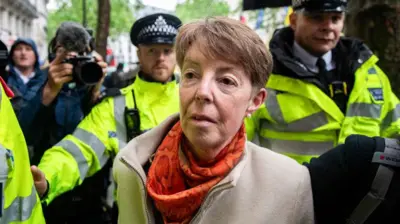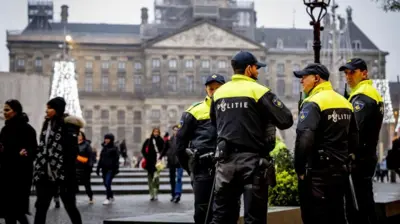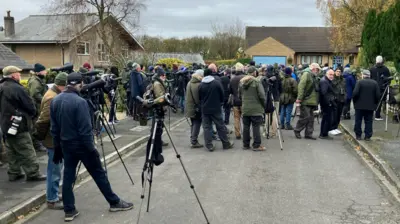We've updated our Privacy and Cookies Policy
We've made some important changes to our Privacy and Cookies Policy and we want you to know what this means for you and your data.
How is the UK stopping Channel crossings and what are the legal routes to the UK?
Image source, Getty Images
The government says "stopping the boats" crossing the English Channel is a key political priority.
As part of this, it is pushing ahead with its plan to send some asylum seekers to Rwanda, despite a Supreme Court judgment that the policy is unlawful.
What is the government's plan to tackle migrants?
Since the Supreme Court ruling, the government has signed a new treaty with Rwanda to strengthen its asylum process, and proposed new UK laws declaring that Rwanda is a safe country.
As well as the Rwanda plan, the Illegal Migration Act includes a number of new provisions:
- the home secretary has a duty to detain and remove those arriving in the UK illegally either to Rwanda, or another "safe" third country
- migrants will not be granted bail or able to seek judicial review for the first 28 days of detention
- under-18s, those medically unfit to fly or at risk of serious harm in the country to which they are being removed, will be able to delay departure
- the number of refugees the UK settles through "safe and legal routes" is capped.
The government also signed a new agreement with France, under which the UK will pay £500m over three years to fund more patrol officers and a new detention centre.
Commercial documents published by the Home Office suggest that the government plans to spend at least £700m to manage small boat arrivals until 2030.
Where are asylum seekers accommodated in the UK?
At the end of September 2023 there were more than 56,000 asylum seekers living in hotels across the UK.
The government hopes to save money by using other types of accommodation instead.
There are currently about 300 asylum seekers housed on a barge called the Bibby Stockholm in Dorset, which has capacity for 500.
In a letter to the Home Affairs Committee of MPs, the Home Office confirmed the contract to provide accommodation on the Bibby Stockholm is worth £22.5m.
Image source, PA Media
In August 2023, all of the 39 asylum seekers then on board were removed after Legionella bacteria was found in the water system.
On 12 December 2023, one of the migrants living on the barge died. The man is believed to have taken his own life.
The government has also said that three ex-military sites in Essex, Lincolnshire and East Sussex will house several thousand migrants:
- Wethersfield in Essex is due to hold up to 1,700 people
- Scampton in Lincolnshire is due to hold up to 2,000
- Bexhill in East Sussex is due to hold up to 1,200
Catterick Garrison in Yorkshire is also due to hold an unspecified number of people.
The BBC understands about 600 asylum seekers are being housed at Wethersfield. In July 2023, some residents tested positive for tuberculosis (TB).
The first asylum seekers were expected to arrive at Scampton in mid-August, but this was delayed until further notice. The Home Office says it is still "exploring proposals" to use the Bexhill site.
In December 2023, the High Court ruled that asylum seekers could be housed at Wethersfield and Scampton, following legal action by the relevant local councils. They have applied for permission to take the case to the Court of Appeal.
The Home Office commercial documents also show the government is looking for a partner to run two migrant reception centres in Kent until at least 2030 - and potentially to 2034.
What are the "safe and legal" routes to claim asylum in the UK?
The Home Office insists there are a number of "safe and legal" routes to the UK.
However, some are restricted to people from specific countries such as Afghanistan and Ukraine, while other routes only accept limited numbers. Figures shown are for the year to September 2023:
- Refugee Family Reunion - for partners and children under 18 of those already granted protection in the UK (6,114 grants)
- UK Resettlement Scheme - prioritises those from regions in conflict (525 grants)
- Community Sponsorship Scheme - for local community groups to provide accommodation and support for refugees (162 grants)
- Mandate Resettlement Scheme - to resettle refugees who have a close family member in the UK who can offer a home (13 grants)
In April 2023, Immigration Minister Robert Jenrick was asked in Parliament which safe and legal routes were available to a young person wanting to flee the conflict in Sudan.
He said individuals should contact the UN Refugee Agency, the UNHCR. But it insisted "there is no mechanism through which refugees can approach UNHCR with the intention of seeking asylum in the UK".
What does international law say about refugees?
Critics of the government's asylum proposals, such as the Refugee Council, say they risk breaking international law.
The main principle of the 1951 Refugee Convention states that refugees should not be returned to countries where they faced threats to life or freedom.
Image source, Getty Images
The government insists its plan to send migrants to Rwanda for their asylum cases to be processed complies with international law.
But the Supreme Court ruled in November 2023 that sending asylum seekers to Rwanda was unlawful because of the risk they could be moved on to countries where they could face harm, known as "refoulement".
In response, the government signed a new treaty with Rwanda which it says will prevent refoulement. It has also published new legislation declaring Rwanda a safe country.
Clarification 2 December: This article has been amended to make clear that the government's "safe and legal" routes are only available to certain groups of people who have already been recognised as refugees, or family members of refugees already in the UK.
Top Stories
More to explore
Most read
Content is not available








